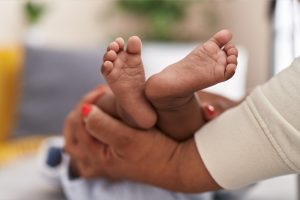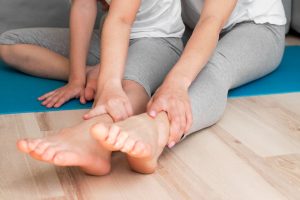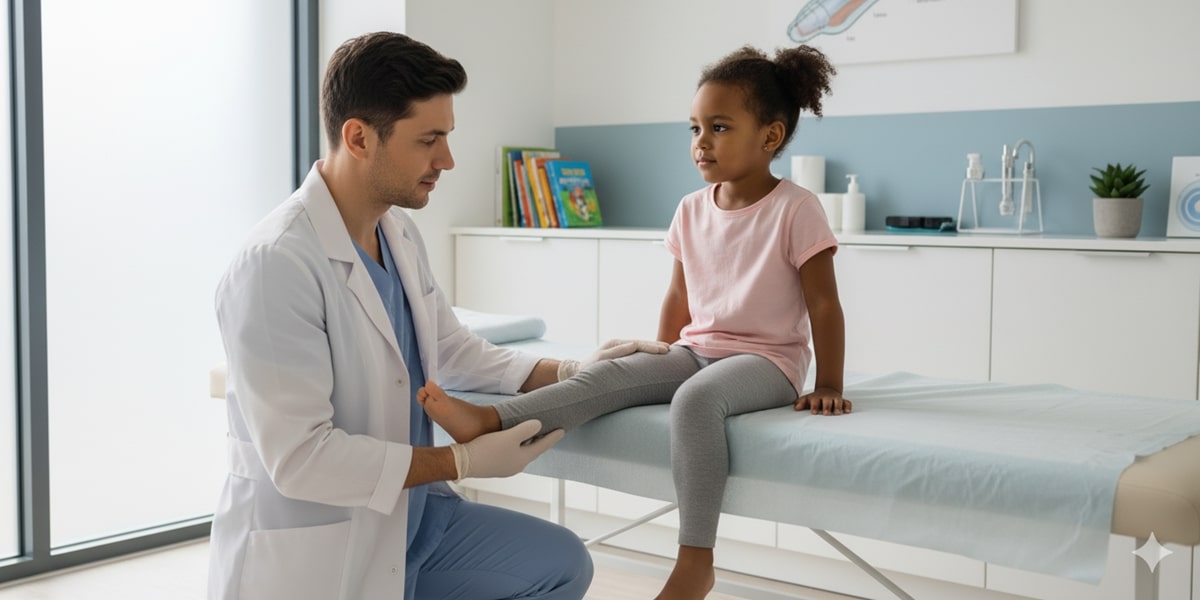Pediatric foot care matters for all parents. The infant specialists at Foot + Ankle Specialty Centers focus on children’s foot health. Our pediatric foot doctors use the latest and best treatments so you and your child can trust the results. To learn more about how children’s feet grow and how to care for them, call our office or make an appointment online. If you’ve been searching for “pediatric foot doctor near me in Scottsdale, AZ,” this guide will help.
What Does a Pediatric Podiatrist Do?
Children’s foot doctors diagnose and treat foot and ankle problems in kids. They treat many conditions from ingrown toenails and flat feet, to birth defects and walking issues.
The Foot + Ankle Specialty Centers in Scottsdale provide both surgery and non‑surgery treatments, all adapted to children’s specific needs.
Why Choose Our Pediatric Podiatrists Scottsdale?
Children often don’t say when they have foot pain. If you notice limping, frequent tripping, or your child avoiding play, it may signal a problem. Parents trust our podiatrists in Scottsdale because we:
- Treat babies through teens.
- Provide care that is gentle and suited for growing feet.
- Speak in words kids can understand.
- Offer personalized treatment plans.
Causes of Pediatric Foot Pain and Problems
Here are common reasons children may have foot pain or issues:
- Inherited traits like flat feet or very high arches.
- Shoes that don’t fit well, causing pressure, bunions, or ingrown nails.
- Injuries from falls or accidents (sprains, fractures).
- Overuse from sports leading to tendon soreness or stress fractures.
- Being overweight, putting extra strain on feet.
- Poor posture or walking/bending alignment.
- Infections: fungal, viral, or bacterial (like athlete’s foot, warts).
- Fast growth causing stress on growing bones (e.g. Sever’s disease).
What are the Most Common Childhood Deformities of the Foot?
Some foot deformities seen in children include:
- Flat feet (low or no arch), which may or may not hurt.
- Clubfoot: a foot twisted or turned out of its normal shape, often visible at birth.
- Metatarsus Adductus: front of the foot curves inward; sometimes resolves without treatment.
- Intoeing (pigeon‑toed): feet point inward when walking; often improves with time.
- Tarsal Coalition: two or more foot bones fused, causing pain or limited movement.
Pediatric Foot Care Treatments in Scottsdale, AZ
At Foot + Ankle Specialty Centers in Scottsdale, we use treatments focused on what helps children best, with minimal discomfort:
- Custom orthotics to support arches, correct walking, ease discomfort.
- Physical therapy to build strength, improve flexibility, and help walking patterns.
- Guidance on proper footwear to avoid pressure, bunions, and nail issues.
- Minimally invasive surgery for serious deformities or injuries that don’t improve with other treatments.
- Specialized treatments for warts, athlete’s foot, Sever’s disease.
- Education on foot hygiene, injury prevention, and choosing good shoes.
How Long Does It Take to Treat Pediatric Foot Problems?
Condition | Typical Treatment Time |
Ingrown toenails | One visit up to a few weeks |
Warts | Several weeks to months |
Athlete’s foot | About 1‑2 weeks |
Flat feet | Months or longer, depending on severity |
Clubfoot | From birth until about age 4‑5 (for full treatment) |
Metatarsus Adductus | First year or a few months, depending on case |
Intoeing | Often improves over several years |
Sever’s Disease | A few weeks to months |
Tarsal Coalition | Requires surgery and months of recovery |
Sprains & Strains | A few weeks to several months |
Pediatric Podiatry Specialist Near Me in Scottsdale, Arizona
If you want top foot and ankle care for your child, we are here. Foot + Ankle Specialty Centers in Scottsdale, AZ, treat children’s foot problems with care and expertise.
Your child’s feet deserve excellent care. Contact us today to learn about all the ways we help young feet heal and grow so kids can walk, run, and play with confidence!
FAQs About Pediatric Podiatry
How do I measure my toddler’s shoe size?
Measure from the heel to the longest toe, then check a kids’ shoe size chart.
When should I take my child to a podiatrist?
If they limp, trip often, complain of foot pain, or have visible foot deformities.
How often should I check my child’s foot size?
Every 2–3 months for toddlers, as their feet grow fast.
What signs show my child may have a foot problem?
Limping, avoiding activity, frequent tripping, foot pain, or unusual walking patterns.
Is it normal for kids to walk on their toes?
Sometimes, yes, but if it continues past age 2 or is constant, get it checked.
When is flat feet a concern?
If it causes pain, affects walking, or doesn’t improve with age.
Related Blogs

Pediatric Flatfoot Deformity and Its Treatment
Pediatric flatfoot is a common problem in kids. It means the arches in their feet don’t form the way they should. Sometimes, flat feet don’t hurt

What Are Clubfoot Baby Foot Problems?
Hearing that your baby has clubfoot is overwhelming. You may have many questions and worries about what this means for your child’s future. The good news

Pediatric Sports Injury Treatment and Signs in Arizona
Athletic children are always at risk of foot and ankle injuries. Running, jumping, and fast and sudden movements can easily injure them. So, children and parents


